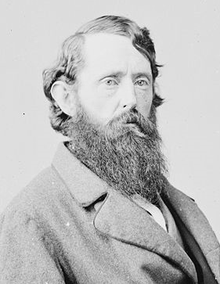
Back بينچامين جراتز براون ARZ بی. قرتز براون AZB B. Gratz Brown German بی. گرتز براون Persian Benjamin Gratz Brown Finnish Benjamin Gratz Brown French B. Gratz Brown Hungarian Benjamin Gratz Brown Polish B. Gratz Brown Swedish
B. Gratz Brown | |
|---|---|
 | |
| 20th Governor of Missouri | |
| In office January 4, 1871 – January 3, 1873 | |
| Lieutenant | Joseph J. Gravely |
| Preceded by | Joseph W. McClurg |
| Succeeded by | Silas Woodson |
| United States Senator from Missouri | |
| In office November 13, 1863 – March 3, 1867 | |
| Preceded by | Robert Wilson |
| Succeeded by | Charles D. Drake |
| Member of the Missouri House of Representatives from St. Louis | |
| In office 1852–1858 | |
| Personal details | |
| Born | Benjamin Gratz Brown May 28, 1826 Frankfort, Kentucky, U.S. |
| Died | December 13, 1885 (aged 59) Kirkwood, Missouri, U.S. |
| Political party | Democratic (Before 1854, 1872–1885) Republican (1854–1870) Liberal Republican (1870–1872) |
| Other political affiliations | Unconditional Union (1860–1866) Radical Republican |
| Spouse |
Mary Gunn (m. 1858) |
| Relatives | Mason Brown (father) Montgomery Blair (cousin) Margaret Wise Brown (granddaughter) |
| Education | Transylvania University Yale University (BA) University of Louisville (LLB) |
| Military service | |
| Allegiance | |
| Branch/service | Union Army |
| Years of service | 1861–1863 |
| Rank | |
| Commands | 4th Regiment U.S. Reserve Corps |
| Battles/wars | American Civil War |
Benjamin Gratz Brown (May 28, 1826 – December 13, 1885) was an American politician. He was a U.S. Senator, the 20th Governor of Missouri, and the Liberal Republican and Democratic Party vice presidential candidate in the presidential election of 1872.
Born in Frankfort, Kentucky, Brown established a legal practice in St. Louis, Missouri. Both of his grandfathers, John Brown and Jesse Bledsoe, represented Kentucky in the Senate. After settling in St. Louis, Brown won election to the Missouri House of Representatives. He became an ally of Thomas Hart Benton and Francis Preston Blair Jr. in the struggle for control of the state Democratic Party against pro-slavery forces. As the 1850s progressed, Brown continued to speak against slavery, and he helped found the Missouri Republican Party.
During the Civil War, Brown worked to keep Missouri in the Union. In 1863, he was elected to the Senate as a member of the Unconditional Union Party. In the Senate, he aligned with the Radical Republicans and opposed many of President Abraham Lincoln's policies. He was part of a movement that unsuccessfully sought to replace Lincoln as the 1864 Republican nominee. After the war, Brown strongly opposed President Andrew Johnson's Reconstruction policies and supported the Freedmen's Bureau bills.
Brown resigned from the Senate in 1867 but helped found the Liberal Republican Party in 1870. The party chose Brown as its nominee for governor, and he defeated incumbent Republican Governor Joseph W. McClurg. Brown sought the new party's 1872 presidential nomination but was defeated by Horace Greeley. After the nomination of Greeley, the 1872 Liberal Republican convention chose Brown as the party's vice presidential nominee. Seeking to avoid splitting the vote of opponents to President Ulysses S. Grant's re-election, the 1872 Democratic National Convention subsequently nominated the Liberal Republican ticket. The Republican ticket nonetheless triumphed in the election, as Grant won 55.6% of the popular vote and a majority of the electoral vote. Greeley died after the election but before the electors officially cast their votes, and Brown received some of Greeley's electoral votes. After the election, Gratz returned to his law practice and affiliated with the Democratic Party.